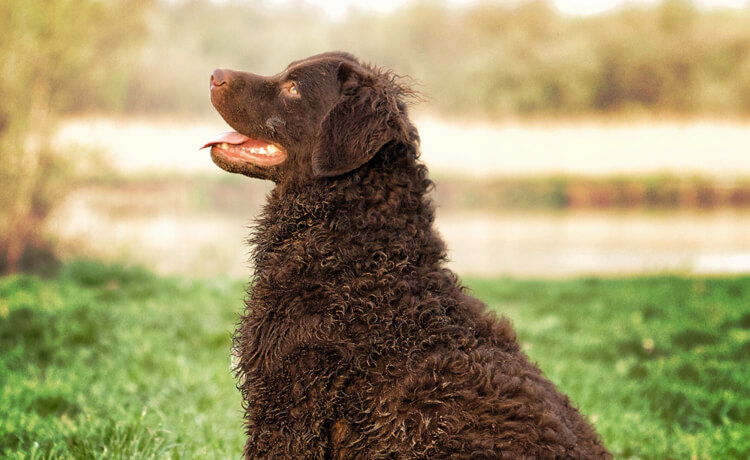
Curly-Coated Retriever
The Curly-Coated Retriever is a unique and versatile breed, known for its distinct curly fur and high intelligence. As one of the oldest retriever breeds, the Curly-Coated Retriever has a rich history and excels in both working environments and as a loyal family companion.
1. History and Origin
The Curly-Coated Retriever is believed to have originated in England during the late 18th and early 19th centuries. The breed’s development likely included influences from the English Water Spaniel, St. John’s Newfoundland, Poodle, and other retriever breeds. These dogs were highly valued for their proficiency in retrieving game from both land and water, making them favorites among hunters.
The breed’s popularity peaked in the 19th century when they were frequently seen in hunting circles across England. Their distinct curly coat, which provided excellent protection against water and harsh weather, set them apart from other retrievers. The Curly-Coated Retriever was officially recognized by the American Kennel Club (AKC) in 1924.
2. Appearance
Essentials for Your Newly Adopted Pet
Welcoming a shelter pet into your life is a beautiful journey. Here are some handpicked items to help your new friend feel safe, loved, and right at home:
- Size: Males typically stand 25 to 27 inches tall, while females range from 23 to 25 inches. Their weight usually falls between 60 to 95 pounds.
- Coat: The breed’s defining feature is its tight, water-resistant curls that cover the body. The coat comes in two main colors: black and liver.
- Eyes and Expression: Curly-Coated Retrievers have almond-shaped eyes that convey a keen, alert expression.
- Build: These dogs have a strong, athletic build that allows them to be agile and efficient in their movements.
3. Temperament
- Intelligent and Independent: Known for their intelligence, Curly-Coated Retrievers can sometimes exhibit an independent streak, making training a blend of challenge and reward.
- Loyal and Affectionate: They form strong bonds with their families and are known for their loyalty and affection.
- Protective: While they are not typically aggressive, they do have protective instincts and make good watchdogs.
- Energetic and Playful: These dogs have plenty of energy and enjoy activities that engage both their mind and body.
4. Health
- Life Expectancy: The typical lifespan of a Curly-Coated Retriever is 10 to 12 years.
-
Common Health Issues:
- Hip Dysplasia: A common condition in many large breeds, where the hip joint doesn’t fit properly.
- Gastric Dilatation-Volvulus (Bloat): A life-threatening condition that can affect deep-chested breeds.
- Eye Problems: Issues like cataracts and progressive retinal atrophy (PRA) can occur.
- Cancer: This breed can be predisposed to certain types of cancer.
5. Care and Grooming
- Coat Maintenance: The curly coat requires minimal grooming compared to other retrievers. Weekly brushing is sufficient to remove loose hairs and maintain the coat’s health.
- Bathing: They only need to be bathed occasionally, as frequent washing can strip the natural oils from their coat.
- Exercise: Regular physical activity is essential to keep a Curly-Coated Retriever happy and healthy. They enjoy activities such as swimming, fetching, and long walks.
- Ear and Dental Care: Regular checks and cleaning help prevent infections and maintain overall health.
6. Training and Exercise
- Training Tips: Positive reinforcement works best with Curly-Coated Retrievers. They are intelligent but can be somewhat stubborn, so consistent and patient training is important.
- Socialization: Early socialization helps these dogs become well-adjusted adults. Exposing them to various environments, people, and other animals is key.
- Exercise Needs: They need daily exercise to prevent boredom and maintain physical fitness. Activities such as agility training and obedience work are excellent for mental stimulation.
7. Best Environment
- Living Situation: Curly-Coated Retrievers do well in homes with access to outdoor space where they can run and play. They adapt to various living conditions as long as they receive adequate exercise.
- Family Compatibility: They are great companions for active families who can involve them in daily activities. Their protective and loyal nature makes them a good fit for families with children.
- Companionship: This breed doesn’t do well when left alone for long periods, as they thrive on human interaction.
8. Fun Facts
- Oldest Retriever Breed: The Curly-Coated Retriever is considered one of the oldest retriever breeds.
- Water Lovers: Their water-resistant coat and natural swimming ability make them excellent water dogs.
- Unique Coat: The tight curls not only protect them from water but also from thorny underbrush when retrieving game.
- Rare Breed: Curly-Coated Retrievers are less common compared to other retrievers, making them a distinctive choice for dog enthusiasts.
Conclusion
The Curly-Coated Retriever is an intelligent, loyal, and versatile breed, perfect for active families who can offer plenty of exercise and companionship. Their unique appearance and history as one of the oldest retriever breeds set them apart, while their affectionate nature ensures they fit right into the family dynamic. With proper care, training, and love, these dogs make wonderful lifelong companions.
Affiliate Products
Up to 75% Discount

Dog Collar with Health Monitoring
BUY NOW »
Up to 55% Discount

Luxury Faux Furhuge Napping Bed
BUY NOW »

